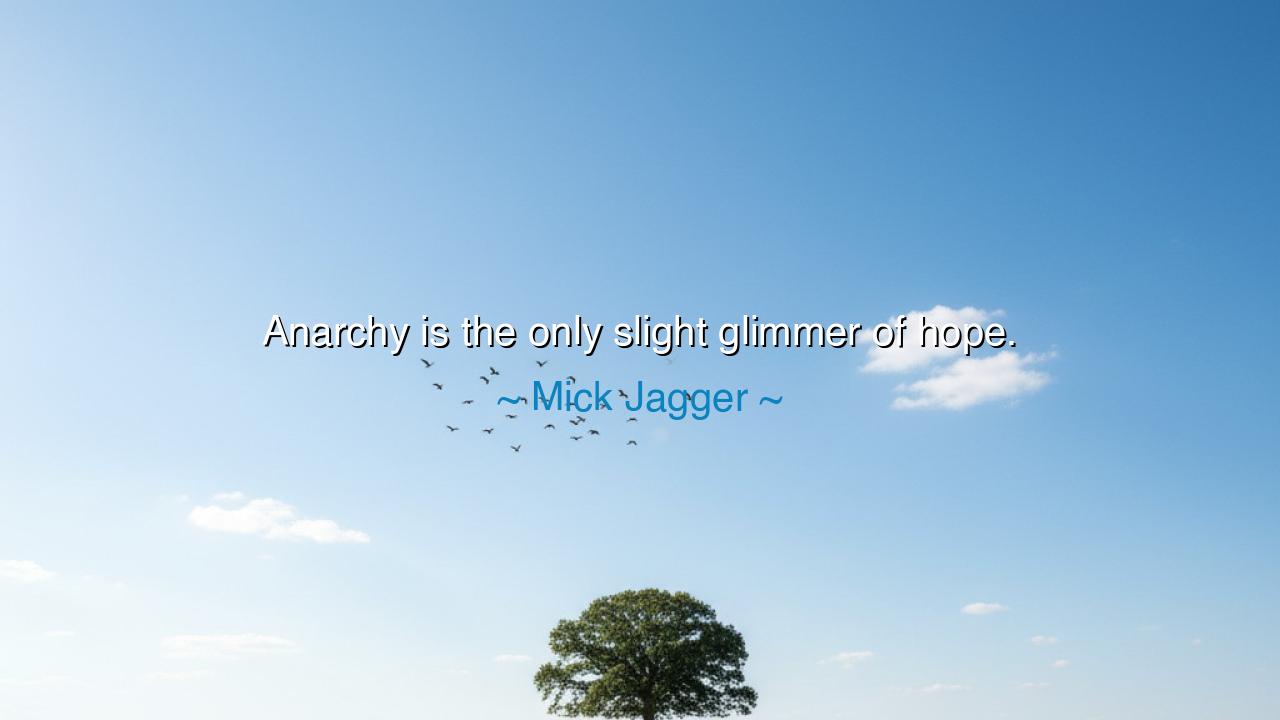
Anarchy is the only slight glimmer of hope.






"Anarchy is the only slight glimmer of hope." – Mick Jagger
In this striking and paradoxical declaration, Mick Jagger, the voice of rebellion and frontman of The Rolling Stones, does not speak of chaos for its own sake, but of renewal through disruption. His words are not the cry of a man who loves disorder, but the lament of one who has grown weary of a world bound by corruption, conformity, and control. When he says that anarchy holds “the only slight glimmer of hope,” he points toward the idea that, at times, the structures we build to protect ourselves become the very prisons that confine us. Only through their shaking, perhaps even their collapse, can new life begin again.
The origin of this quote lies in Jagger’s early years — an era when youth across the world were rising against the rigid hierarchies of politics, class, and tradition. The 1960s were a time of awakening and unrest, when the young saw hypocrisy in governments preaching freedom while waging war, and in societies preaching morality while silencing truth. To them, “anarchy” symbolized not destruction, but the breaking of chains. It was the fiery spirit that refused to accept the world as it was — that demanded something better, even if it had to be born from the ashes of rebellion. Jagger’s words capture that spirit: hope found not in obedience, but in the courage to tear down what no longer serves life.
Yet, to understand this quote fully, one must look beyond the noise of riot and see the deeper meaning of anarchy — the ancient yearning for a life free of domination, where humanity governs itself by conscience, not coercion. In this sense, “anarchy” is not chaos but freedom reclaimed. It is the primal faith that people, unshackled by tyranny and greed, can build communities rooted in justice and compassion. The great philosopher Lao Tzu once wrote that the best rulers are those whose people barely know they exist — for when men are free to live naturally, order arises not from power, but from harmony. Thus, even in the word “anarchy,” the wise may glimpse a vision of a world restored to balance.
History itself has known moments when hope was born from the ruins of order. When the French Revolution erupted, it was not merely a storm of blood and fury; it was also a cry for liberty, equality, and fraternity. Though it descended into terror, its fire burned away centuries of feudal decay and gave birth to modern democracy. Similarly, in the fall of empires, from Rome to the colonial powers of the modern age, humanity has often found its greatest rebirths. For every crumbling system carries within it the seed of renewal, just as the forest fire paves the way for new growth. Jagger’s “glimmer of hope” lies precisely in that — the belief that even destruction can serve creation, when guided by the desire for truth and freedom.
But this hope is not without peril. The ancients knew that freedom without wisdom becomes madness. When the fire of rebellion burns too hot, it consumes rather than purifies. Anarchy, if untempered by vision, can become the very darkness it sought to dispel. Thus, the wise must understand Jagger’s words as a warning as well as a dream. Hope may live in the spark of rebellion — but if it is to survive, it must be fed not by hatred, but by love for what could be built anew. True revolution, the kind that redeems rather than destroys, must rise not from rage alone, but from the patient labor of conscience.
And so, my children, take from this not the call to burn, but the courage to question. When the world seems rigid with injustice, do not surrender to despair — nor to blind fury. Instead, let anarchy live within you as a sacred fire: the refusal to accept falsehood, the courage to defy corruption, the dream of a purer world. Let it destroy only what is rotten, and preserve what is true. For every great age of renewal begins when brave souls dare to unmake the world in order to remake it more justly.
Lesson: Do not fear rebellion when it is born of conscience, nor cling blindly to order when it has become oppression. Let your hope be fierce, but let it be guided by wisdom. For anarchy, in Jagger’s vision, is not the end of civilization — it is its cleansing storm, the “slight glimmer of hope” that appears when all else seems lost. In that light, we are reminded that sometimes, to build a better world, we must first have the courage to break the old one open.






AAdministratorAdministrator
Welcome, honored guests. Please leave a comment, we will respond soon